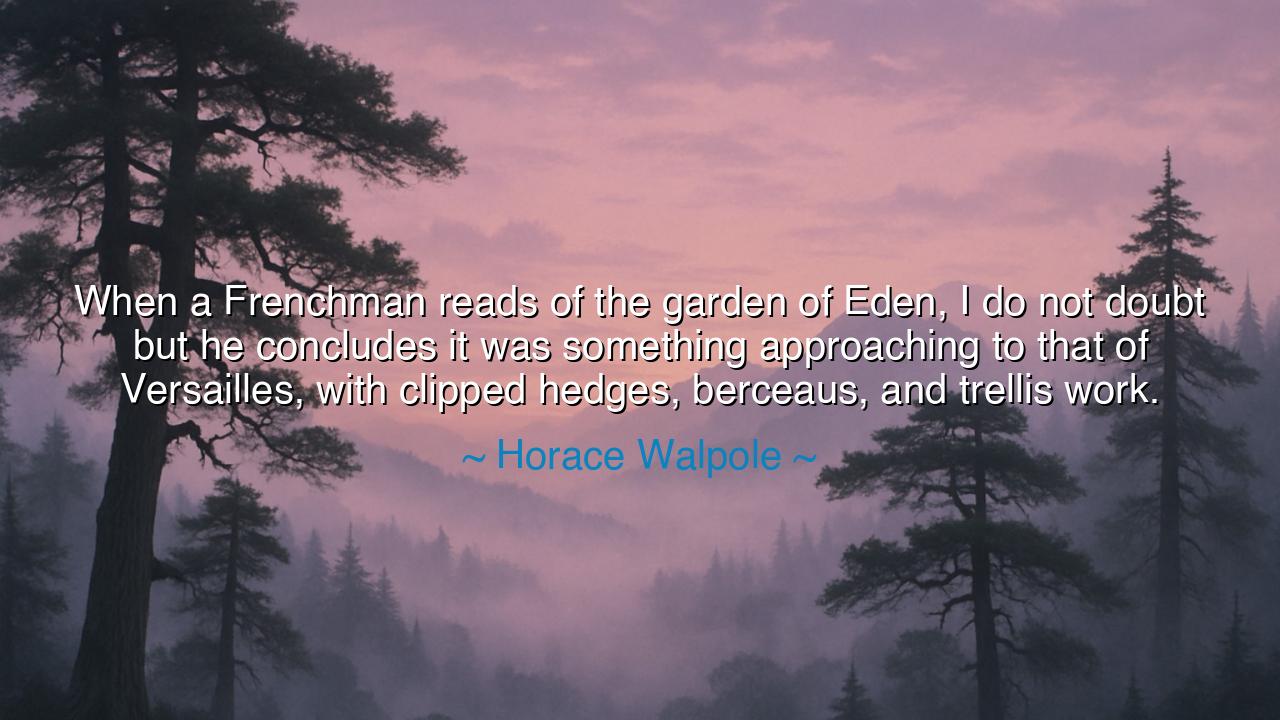
When a Frenchman reads of the garden of Eden, I do not doubt but
When a Frenchman reads of the garden of Eden, I do not doubt but he concludes it was something approaching to that of Versailles, with clipped hedges, berceaus, and trellis work.






Hear now the voice of Horace Walpole, who once declared with wit and wisdom: “When a Frenchman reads of the garden of Eden, I do not doubt but he concludes it was something approaching to that of Versailles, with clipped hedges, berceaus, and trellis work.” In these words is not merely a jest, but a mirror of the human soul: that men, when they imagine paradise, often reshape it in the likeness of their own world. Thus, Walpole teaches us that the mind cannot escape its own customs, and even the divine is painted in the colors of what we already know.
The meaning of this saying is profound. Walpole suggests that when the Frenchman, steeped in the grandeur and artifice of Versailles, imagines Eden, he cannot help but think of a garden adorned with symmetry, polished paths, and gilded order. But Eden, the dwelling of the first innocence, was no palace of human design; it was a wilderness of divine perfection. Here lies the heart of the lesson: mankind often mistakes his own culture for the measure of all things, projecting his own vision onto the mysteries of heaven.
The origin of this thought rests in Walpole’s world, where nations defined themselves through art, architecture, and taste. The French, enamored of Versailles, saw in it not merely a palace but the pinnacle of beauty. Its clipped hedges and endless rows of fountains represented to them the triumph of man over nature, the shaping of the wild into order. Thus Walpole, with the sharpness of irony, suggests that even when contemplating Eden, such a man cannot free himself from the imagery of his own culture.
History offers us many examples of this truth. Consider the medieval artists who painted Christ and the saints, not in the garb of ancient Judea, but in the robes and crowns of their own Europe. They clothed the eternal in the fashions of their age, for the human mind struggles to see beyond its own horizon. Or think upon the early explorers who, when discovering new lands, called them Edens or paradises, imagining them through the lens of their own ideals rather than the reality before them. Paradise, it seems, is always reshaped by the eye of the beholder.
The lesson is clear: beware the temptation of confining the infinite to the forms of the familiar. The garden of Eden was not Versailles, nor is paradise any one culture’s invention. To imagine heaven through the narrow lens of our own customs is to shrink the vastness of creation. True wisdom is found in humility, in recognizing that what lies beyond us cannot be bound by our hedges, our trellises, or our gilded halls.
Practical guidance flows from this. When you encounter what is foreign, do not reduce it to the measure of your own world. Let your imagination be stretched, not confined. If you read of Eden, think not only of your gardens but of the wild forests, the deserts, the mountains that surpass human artifice. Learn to honor beauty that does not mirror your own. In this way, you will enlarge your vision and escape the prison of cultural vanity.
So let Walpole’s words echo in your heart: when you dream of the eternal, do not remake it in your image, but seek instead to glimpse it in its true vastness. For Versailles may dazzle the eyes, but Eden is larger than Versailles; it is the dwelling of innocence, untouched by human hand. Let this remind you that the divine cannot be contained by symmetry, nor paradise by architecture. Seek always to lift your eyes beyond what is known, that you may behold what is truly infinite.
Thus, future generations, remember: do not confuse the world you know with the world that is. Broaden your sight, honor all forms of beauty, and walk humbly in the face of mystery. For paradise is not the mirror of man’s garden—it is the masterpiece of God’s.






QQQuyen Quyen
Walpole’s insight is fascinating in how it highlights the influence of cultural identity on imagination. I think many people do, consciously or unconsciously, apply their own experiences to interpret stories. But do you think this ever limits or distorts our understanding? Can we ever fully separate ourselves from our cultural biases when engaging with history or mythology?
HMNguyen Hoang Minh
This quote makes me reflect on the power of place and culture in shaping our imagination. The idea that a Frenchman would imagine the Garden of Eden as something like Versailles is a great example of how environments and experiences influence our perceptions. How do you think this applies to the way we view other historical or mythical places? Are we guilty of imposing our own interpretations onto the past?
HNTran Huu Hoang Nam
I find Walpole's observation amusing because it shows how our own cultural context can alter the way we perceive something, even something as sacred as the Garden of Eden. I wonder, though, do you think this tendency to interpret stories through the lens of our own experiences is a universal trait? Or is it more specific to certain cultures, like the French, with their rich history of art and architecture?
TTHao
Horace Walpole’s quote is a witty commentary on how culture and personal experiences shape the way we interpret the world. The idea that a Frenchman might see the Garden of Eden as resembling the grandeur of Versailles speaks to the deep connection between history and identity. How do you think our own backgrounds shape the way we interpret symbols or stories? Could this influence our understanding of something as universal as religious texts?